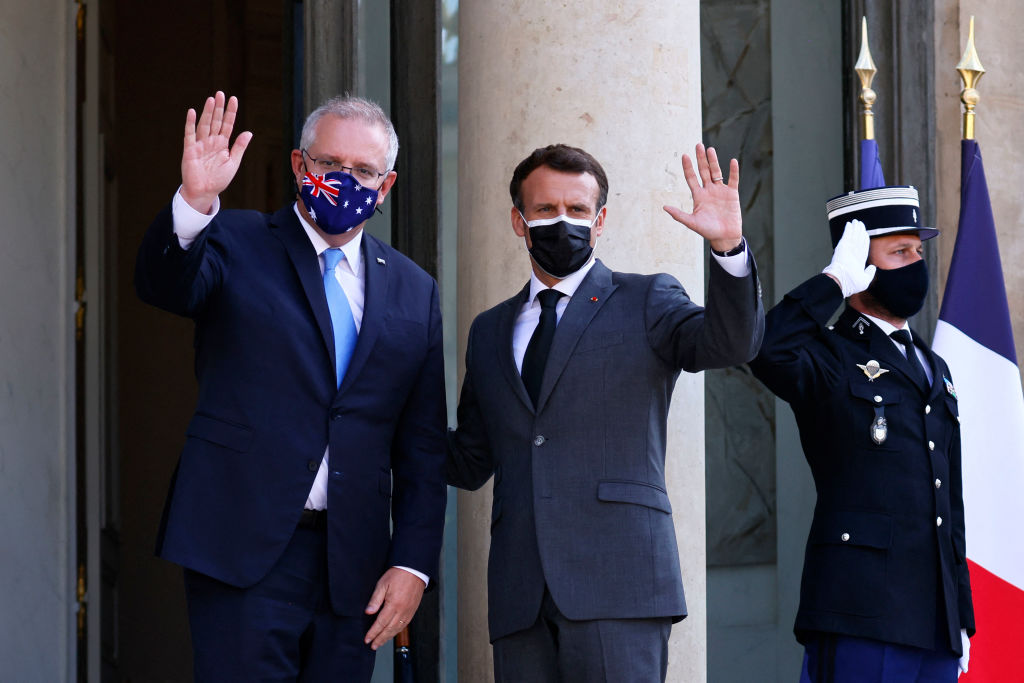Australia must work to salvage relations with France

Accusations of backstabbing. Cancelled meetings. Ambassadors recalled. You’d be forgiven for thinking Australia had committed a mortal sin against France.
In reality, despite the characteristic French bluster, the change of direction on Australia’s submarines reflects the kind of shrewd decision-making that nations like France constantly employ.
That’s not to dismiss French consternation. But Australia must look beyond the emotionally charged rhetoric to understand Paris’s underlying interests.
For all the talk of mateship and fraternité, France never would have agreed to the submarine deal if it didn’t stand to make a substantial profit, just as Australia would only continue the program as long as it remained its best strategic option. And like any large procurement, the contract built in off-ramps, anticipating changing circumstances and compensation.
Paris will understand the brutal logic of Australia’s decision, a trait hardly absent in its own strategic culture. And doubtless it would have done the same in Canberra’s shoes. This will temper the long-term fallout and diminish Paris’s claim to the moral high ground for too long.
In the meantime, some diplomatic hand-wringing is unavoidable; Australia needs to accept it’ll be in the French freezer for a while. President Emmanuel Macron’s credibility is personally tied to the deal, and a tough re-election campaign looms. The people of Cherbourg, where the submarine project was based, will suffer economically. And the French defence industry, the world’s third largest arms exporter, will kick up a stink to deter other customers from rescinding.
In short, France needs to punish Australia—or, perhaps more accurately, needs to be seen to punish Australia. Foreign villains—in this case, the old English enemy and its colonial progeny—help shift the blame away from the French government.
Australia needs to see this for what it is. The AFiniti agreement might be quietly forgotten and we’re unlikely to see a French president deliver a keynote address on Sydney Harbour again soon. But none of France’s core interests in the Indo-Pacific were ever contingent on the submarines. Its people and possessions in the Indo-Pacific remain—as does its permanent military presence.
France’s intent towards the region is well established—and it has been the driving force behind a more coherent European approach. The French aren’t about to change their worldview because of a cancelled defence contract. Above all else, though, the single most powerful factor driving strategic convergence between Europe, the US and Australia remains—that is, an increasingly aggressive China. Don’t underestimate the ability of a common adversary to focus the minds of squabbling allies on what really matters.
The challenge for Canberra won’t be about resolving a clash of fundamental interests with France, but about rebuilding the means to influence and cooperate with Paris.
Australia needs some quick wins here, especially with ongoing EU free-trade negotiations and the Glasgow climate talks around the corner.
First, Canberra should negotiate generously and in good faith on the compensation to Naval Group. This will demonstrate respect and help the French save some face.
Second, Australia should lean on history to remind the French that the relationship is bigger and more profound than a procurement disagreement. Canberra could offer to make a significant investment in maintaining Commonwealth war graves in France and upgrading the remembrance infrastructure, using French labour.
And third, some strategic concessions could be made to French producers in FTA negotiations, though Australia should be careful linking trade and defence.
Gestures alone, however, will not be enough.
There’s no shortage of smaller defence procurements Australia could source from French providers. More substantially, Canberra should present concrete proposals for French troop rotations in Australia and potentially even a basing arrangement for French ships.
Australia should also be working intensely with its AUKUS and Quad partners on a formal security offering. Intelligence-sharing might be a good start.
December’s New Caledonia independence referendum, though, presents Australia’s greatest opportunity.
Any degree of New Caledonian independence carries risk for Australia and France. Neither country would say it openly, but the stabilising effect of the French political and military presence is the surest guard against a pro-China independent government emerging in New Caledonia.
Australia can be France’s most valuable external partner in New Caledonia, working closely together to shape what a more autonomous New Caledonia might look like. Australia also enjoys far stronger relations with New Zealand and Melanesia, especially Vanuatu, meaning it can coordinate regional influence over New Caledonia’s future much better than France can.
If New Caledonians do opt for independence, then Australia will be a powerful moderating voice against any rash moves as Noumea discovers its own foreign policy. Australia can also help maintain a French military presence in the region should France have to withdraw to any extent from New Caledonia.
The submarine decision has set Franco-Australian relations back at least a decade. But compelling reasons of strategic convergence mean Australia should be optimistic that it can rebuild influence with France.
